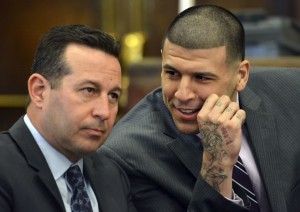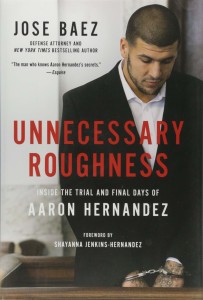Just What Happened to Aaron Hernandez?
Triumphs and tragedy are two words that perfectly exemplify the life of Aaron Hernandez. Growing up in the Connecticut suburb of Bristol, he was a three-sport star, winning the Gatorade player of the year, awarded to the best football player in the state. However, while Aaron succeeded on the field, his time in Bristol may have led to the beginning of his downfall.
A Troubled Past
According to a book written by his brother, Hernandez was sexually assaulted numerous times when he was as young as 6 years old, by an older boy they used to hang out with. Combined with having an abusive father that not only struck Aaron and his brother but also Aaron’s mother, it’s clear he was brought up in an extremely toxic environment. Through it all, Hernandez kept his experiences hidden inside his own head due in large part to being taught that seeking help was a sign of weakness growing up. He kept moving forward.
Following his father’s death in 2006 due to a complication during hernia surgery, Aaron was persuaded by Urban Meyer to switch his college commitment from UConn to the University of Florida. Meyer was known for recruiting numerous players with character concerns and turning them into stars. While at Florida, Hernandez was given special considerations by the coaching staff to make sure he stayed on a straight line. These considerations included a pairing with Mike and Maurkice Pouncey — now NFL offensive lineman — to look out for him, and known-Christian Tim Tebow as a life coach.
The Promise of a Future
These safeguards didn’t seem to live up to the intent Meyer envisioned as Hernandez got into a violent altercation with a bar manager over a $12 bar tab in his first semester enrolled at the school while he was 17. Tebow unsuccessfully tried to break up this incident as the bar manager suffered a burst eardrum following a sucker punch from Hernandez. According to police, charges were never filed following the incident. That following semester Hernandez was suspended from the first game of the season for a suspected failed drug test, although Meyer always stood firm stating that was not the case.
After Hernandez’s junior year, reports stated Myer would kick Hernandez off the team if he didn’t leave for the NFL draft. Once again, Aaron ended up in a situation catered to his troubled past — the New England Patriots love taking chances on talented players in hopes they can police them enough to become productive teammates. However, employment from his hometown team may have led to his death after all.
Returning to his roots in New England subjected him to his old hometown friends which found him enthralled in guns, drugs and other gang-related activity. While it did not affect his on-field play — he signed a $40 million contract in 2012 — Hernandez stated he was often high while playing.
His consistent drug use did not stop at marijuana — he was a known user of the hallucinogenic drug, PCP, a substance known for creating violent actions and paranoia. This may help explain much of Hernandez’s chaotic behavior in certain instances prior to his arrest for murder in 2013. Heavy entrenchment in gang-activity caused Hernandez to fear for his life. He was scared enough that in 2013 he traveled to the NFL combine to talk to the Patriots head coach, Bill Belichick about the issue. Belichick recommended he take some time away from the area and stay in a safe house when back in the New England area.
His Final Days
His paranoia revolved around the gang wanting to take his life, causing him to constantly carry a firearm, install security cameras throughout his mansion and keep a large knife in his nightstand. When asked about the knife by his brother, Aaron responded, “I sleep with it because people are after me. I’ve got it for protection.” And when asked who was after him, Aaron responded, “Everyone. The FBI, everyone.”
While in prison he became very good friends with his lawyer, Jose Baez. Baez wrote about Aaron’s life behind bars in his book released in August of 2018. In his book, Baez expresses how Hernandez would enjoy scenes with the caring, fun-loving side of Aaron that many hadn’t seen in years.
A few days after, Baez helped win an acquittal of a double homicide that occurred in 2012. At the time, Hernandez chose to hang himself in his jail cell. A truly tragic ending to the story of an extremely talented, yet troubled kid from Bristol, CT.


